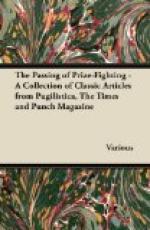TYRTAEUS’ heart has ceased to beat,
But still his measures run,
And still abides the British Press,
Which men must credit, more or less,
To tell how things are done.
So by all bards with hearts of fire
Cheerfully be it sung,
That still our people may not tire
In doing well, but yet aspire;
Let these renew TYRTAEUS’ lyre,
Let others hold their tongue.
* * * * *
OUR BOOKING-OFFICE.
(BY MR. PUNCH’S STAFF OF LEARNED CLERKS.)
A volume called Curious Happenings (MILLS AND BOON) can boast at least a highly attractive, open-and-see title; to which is added, in the present instance, a wrapper-picture of the most intriguing brand. Perhaps not quite all the contents of Miss MARJORIE BOWEN’S book of short stories fully live up to the promise of its outside (what stories could?), but they have amongst them one, from which both title and picture are taken, of very unusual and haunting quality. So, if you should only be able to snatch so much time from work of National importance as suffices to read a single tale, begin at the start, and be assured of having the best. Not that the others are without their attractions, though one is rather gratuitously revolting. Laid in the picturesque eighteenth century, they all exhibit Miss BOWEN’S very pretty gift for costume-drama at its happiest. The trouble is that, with a volume of such short tales, stories of situation, one gets too familiar with the method—as, for example, in “The Folding Doors,” where a lady’s husband and lover had played out their scene before the closed doors (with an alleged cut finger for the husband), and I knew only too well in what state the flinging open of the doors would reveal the lady herself. But perhaps I am exceptionally cursed in this matter; and, anyhow, a volume that contains even one story so good as “The Pond” is a thing for gratitude and rejoicing.
* * * * *
I may have been wrong in turning to a novel for mental relief; anyhow, I have just come through one of the toughest bouts of relaxation I can remember, and my only solace for the slight weariness of such repose is the thought how much more tired the author, Mr. BASIL CREIGHTON, must be. With such a hail-storm of metaphor and epigram constantly dissolving in impalpable mist of mere words has he assaulted The History of an Attraction (CHATTO AND WINDUS) that the poor thing, atomised, vaporised and analysed to the bone, lies limp and lifeless between the covers, with hardly a decent rag of incident or story to cover it. And there one might perhaps be content to let it rest, but for the fact that Anita, the lady of the “Attraction,” is worthy of a better fate. The principal man of the book, who, after much wobbling consideration, and in spite of his quite fortuitous marriage with some one else in the meantime, discovers




